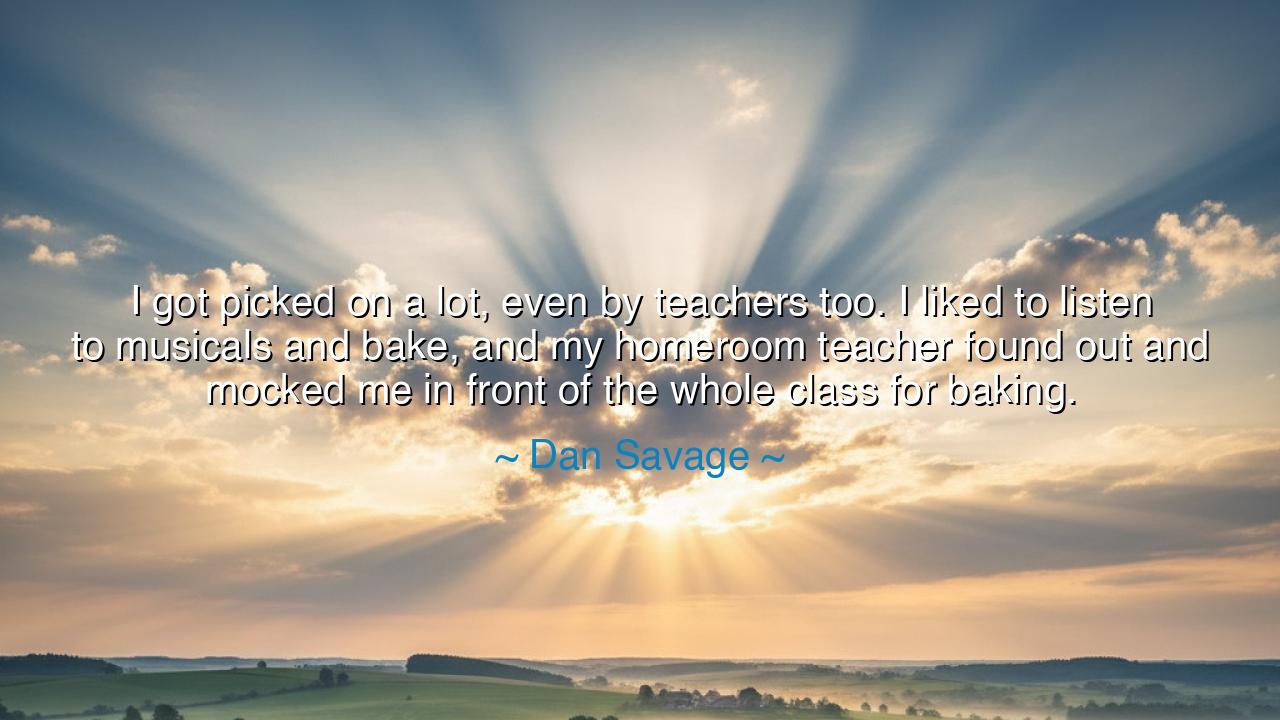
I got picked on a lot, even by teachers too. I liked to listen
I got picked on a lot, even by teachers too. I liked to listen to musicals and bake, and my homeroom teacher found out and mocked me in front of the whole class for baking.






Hear the sorrowful yet defiant words of Dan Savage: “I got picked on a lot, even by teachers too. I liked to listen to musicals and bake, and my homeroom teacher found out and mocked me in front of the whole class for baking.” This is not merely a memory of cruelty, but a testimony to the ancient struggle of the human soul—to be true to itself in the face of ridicule, to guard its tender uniqueness when the world, even those meant to guide, would trample it.
For the cruelty Savage endured shows us how those entrusted with power may sometimes become the very instruments of harm. A teacher, meant to nurture, became a mocker. Classmates, meant to be companions, became tormentors. Yet in this injustice shines a lesson: that the worth of our passions does not diminish because others scorn them. The love of musicals, the craft of baking—these are not weaknesses, but sparks of individuality, gifts of creativity, whispers of the soul’s true calling. To be mocked for them is painful, but to abandon them would be a greater tragedy.
History itself is filled with stories of those mocked for their difference who rose to greatness. Consider Vincent van Gogh, who was dismissed, scorned, and rejected in his lifetime, laughed at for his art that broke the rules of form and color. Yet today his works hang in the world’s greatest halls, his vision immortal. Or think of Alan Turing, mocked for his manner and condemned for his private life, yet it was he who broke the code of Enigma and hastened the end of the Second World War. Like Savage, they bore the sting of mockery, but their gifts endured, and through endurance, they changed the world.
This reveals the deeper truth of Savage’s words: that the mocking of another’s passion arises not from strength, but from fear. The world fears what it does not understand, and so it lashes out. The musicals and the baking that drew laughter from his peers were in fact symbols of creativity, of tenderness, of a life that dares to embrace beauty. The laughter of the crowd may wound, but it is hollow compared to the joy of a soul living in truth.
What then is the lesson, O children of tomorrow? It is this: never forsake your gifts for the comfort of conformity. If you are mocked for singing, keep singing. If you are laughed at for creating, keep creating. If your kindness is mistaken for weakness, let it shine all the brighter. For mockery passes like smoke, but the strength to remain yourself endures like stone. In the end, the world does not honor those who imitated its cruelty, but those who bore its blows and still stood true.
Practical wisdom follows: when others mock you, do not answer with shame but with persistence. Seek allies who see your worth, and offer the same to others who are ridiculed for their differences. Remember that the teacher’s words of cruelty were a lie, but your love of baking, your delight in music, these are the truth of who you are. Protect them, nurture them, let them grow strong until they become not the cause of your shame, but the banner of your strength.
Therefore, let Savage’s words echo as a call: the world may pick on you, even those meant to protect you may mock you, but you must remain steadfast. Your passions are not follies, but treasures. Your uniqueness is not weakness, but power. Hold fast to what you love, for in that love you will find resilience, identity, and the strength to transform scorn into triumph. The laughter of others is fleeting, but the truth of yourself is eternal.






AAdministratorAdministrator
Welcome, honored guests. Please leave a comment, we will respond soon